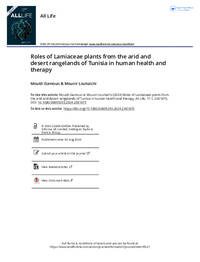Roles of Lamiaceae plants from the arid and desert rangelands of Tunisia inhuman health and therapy

Authors:
The arid rangelands, abundant with diverse flora, play a pivotal role as sanctuaries for essential medicinal herbs. Despite their limited species diversity, Lamiaceae plants hold multifaceted significance in medicine, aromatics, and cuisine. With diverse biological activities such as anti-inflammatory, antimicrobial, antiviral, anticancer, antifungal, antiseptic, antirheumatic, and antidiabetic properties, they serve as valuable antioxidants for treating various ailments. This review delves into the latent utility and intricate biological properties of Lamiaceae species in Tunisia’s arid rangelands, emphasizing their pivotal role in traditional and modern medicine. Focused on the medicinal properties of Lamiaceae species, the review not only highlights their latent utility but also addresses crucial aspect of meeting local and global needs. Stressing their significance in traditional and contemporary medicine, the review underscores their potential contribution to biodiversity preservation. Aligned with the United Nations’ Sustainable Development Goals, particularly SDG 3 on good health and wellbeing, and SDG 15 on biodiversity conservation, the study advocates collaborative efforts to address environmental challenges in Tunisian desert rangelands. A holistic approach, considering social, economic, and environmental dimensions, is deemed essential for achieving these goals and ensuring the sustainable utilization of valuable resources in arid lands
